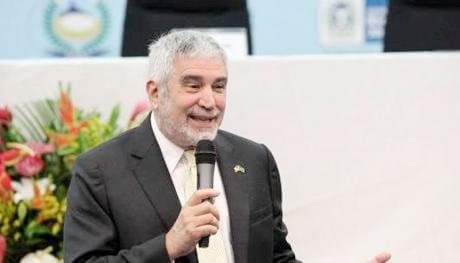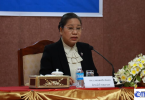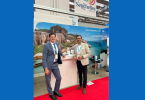This article is an update of one published in honor of the
Twenty-fifth anniversary of the Las Vegas International Tourism
Security and Safety Conference.
The 27th conference will be “reborn” on April
26-30, 2020 and it is hoped that the “mother conference” will spawn
new interest in the importance
of tourism security and safety around the world. If your community is
interested in hosting a tourism safety and security conference, please contact
Dr. Peter Tarlow or Jordan Clark. The Conference will take place against a
background of both political and health crises that could impact the world’s
entire tourism industry
Some basic Tourism Security Conference history: In May of
1992 Lt. Curtis Williams, a visionary Las Vegas police officer had an idea that
tourism to be successful needed to have not only protection but also regular
meetings where ideas might be exchanged and new concepts would be developed.
Lt. Williams and Dr. Peter Tarlow were able to obtain a small room at the Las
Vegas Tourism Convention center and ran the first tourism security workshop.
Since then, the idea of tourism security has become an
important part of tourism. The then workshop, and soon to be full conference,
proved to be logistically too hard for Williams and Tarlow to do everything on
their own, and in its second year, Don Ahl, of the Las Vegas Convention and
Visitors Authority, and the Las Vegas Chief’s Association agreed to become
co-sponsors. Upon Don Ahl’s retirement, he passed his baton to Ray Suppe of the
LVCVA. Ray Suppe and Peter Tarlow than transformed the conference into an
international conference with speakers coming from around the world. In 2019
Suppe passed the baton to Mr. Jordan Clark and Clark and Tarlow have now
reframed the conference so that it will become a major international tourism
security conference.
From 1992 onward Las Vegas has held a tourism security
conference for every year (except one) for the last twenty-six years. This
month’s Tourism Tidbits focuses on some of the major principles of tourism
security. It is dedicated to tourism security personnel throughout the world,
be they members of law enforcement, government agencies, or be they part of private
security teams. We also dedicate it to all tourism professionals. Without
tourism security tourism will cease to exist. Were it not for the dedicated and
hard working men and women who seek to protect the traveling public, in today’s
violent world there would not be (or a greatly reduced) a tourism industry, and
the world would be a much darker and poorer place.
As a thank you to all who work to make the world safe and
secure for the millions of people who travel daily, Tourism Tidbits provides
its readers with some of the basic principals of tourism security.
Tourism Safety and Security are essential parts of any
tourism marketing efforts. Once upon a time tourism professionals did not see
the relationship between tourism security and marketing efforts. This lack of
vision is no longer the case. Today we know that the public seeks out locations
that provide good service, high-quality products and are “packaged”
in a safe and secure environment.
No one needs to come to your locale. This principle was as
true twenty-seven years ago with regards to the leisure side of the market as
it is today. Today, with multiple internet systems, meetings can easily be held
online. The key is that if your community is not safe, then the loss of
business will be a lot greater than the cost of security. It is essential to
remember that the lower the perceived safety the lower the relaxation and
willingness to spend. Good tourism security means that visitors are more likely
to return to a destination and during their stay they are more willing to spend
more money.
Tourism Security is much more than simply guarding a
property. Today we live in a world filled with multiple threats, from the
potential of a bio-chemical attack to cyber-attacks, from crowd control to the
potential of a dirty bomb, from classical crimes such as pick-pocketing to room
invasions, and from food safety to disease control. Modern security analysis
need to be aware of ever changing threats, how threats intertwine with one and
other, to whom to turn, and what are the proper questions to ask.
Tourist geography matters. Through careful study tourism
security specialists have learned that as tourism entities cluster, there is a
higher probability of increased revenues but also a higher probability of crime
and terrorism. Thus, tourism centers that desire to be successful (and
clustering such as in the world of casinos tends to increase profitability)
must invest in all aspects of security if they are to protect these vital
assets.
The traveling public has a long memory. Tragically the
further one is from an “event” the worse it seems and the longer it
lasts in people’s memories. Locals, including tourism professionals tend to
forget past crisis, but these crises not only live on in the internet but also
have long after-lives that impact a location’s or business’ bottom line.
Always ask yourself: what is the cost of a negative headline
(s) to Tourism security is not merely about dealing with an incident after it
happens. Good tourism security is all about prevention and proactive behavior.
A good rule of thumb is: the best crisis management is often good risk
management. It is a lot less expensive to prevent a crisis than it is to
recover from a crisis.
Tourism security is more than dealing with crime; it deals
with the total well-being of the visitor. This principle means that good
tourism security also requires good communication and foreign language skills,
an understanding of cultural awareness, interpersonal psychology, and being
able to differentiate local perceptions from visitors’ needs.
Tourism security means understanding environmental needs and
working toward local beautification. Although we should not judge a book by its
cover, visitors judge a local by the way it looks. Good tourism security
requires clean air and water, and streets that are free of garbage and graffiti.
Beautification not only helps to bring down crime rates, but also increases a
visitor’s proclivity to spend money. Locations that lack beautification end up
with numerous other problems that range from potential diseases to the
potential for gang violence.
Tourism TOPPs police units not only add to the bottom line
but adds to a community’s overall well-being. There was a time when the tourism
industry shied away from special tourism police units. The fear was that
tourists and visitors would see police officers, become scared and leave. The
opposite has proven to be true. Visitors report that when they see well-trained
tourism police units, they have a higher tendency to feel safer, to spend more
money and to enjoy themselves
This year’s Las Vegas Conference marks twenty-seven years of
tourism security. These have been years filled with learning, training, and
most of all, caring for the tourism industry. Let’s hope that future years are
even more productive.
The author, Dr.
Peter Tarlow, is leading the SaferTourism program by eTN Corporation.
Dr. Tarlow has been working for over 2 decades with hotels, tourism-oriented
cities and countries, and both public and private security officers and police
in the field of tourism security. Dr. Tarlow is a world-renowned expert in the
field of tourism security and safety. For more information, visit safertourism.com.






